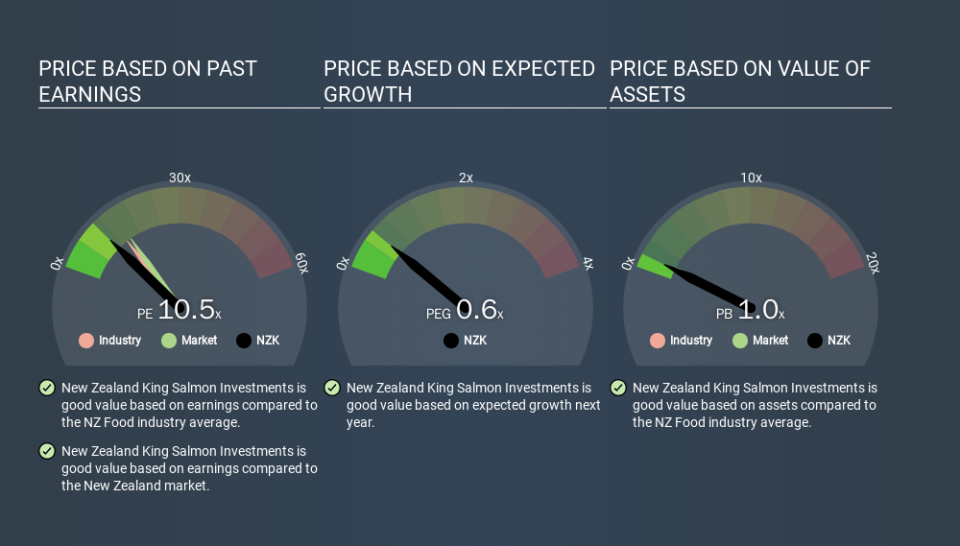How Does New Zealand King Salmon Investments's (NZSE:NZK) P/E Compare To Its Industry, After The Share Price Drop?

To the annoyance of some shareholders, New Zealand King Salmon Investments (NZSE:NZK) shares are down a considerable 41% in the last month. That drop has capped off a tough year for shareholders, with the share price down 48% in that time.
All else being equal, a share price drop should make a stock more attractive to potential investors. In the long term, share prices tend to follow earnings per share, but in the short term prices bounce around in response to short term factors (which are not always obvious). So, on certain occasions, long term focussed investors try to take advantage of pessimistic expectations to buy shares at a better price. Perhaps the simplest way to get a read on investors' expectations of a business is to look at its Price to Earnings Ratio (PE Ratio). Investors have optimistic expectations of companies with higher P/E ratios, compared to companies with lower P/E ratios.
View our latest analysis for New Zealand King Salmon Investments
How Does New Zealand King Salmon Investments's P/E Ratio Compare To Its Peers?
New Zealand King Salmon Investments's P/E of 10.50 indicates relatively low sentiment towards the stock. We can see in the image below that the average P/E (13.7) for companies in the food industry is higher than New Zealand King Salmon Investments's P/E.
New Zealand King Salmon Investments's P/E tells us that market participants think it will not fare as well as its peers in the same industry. While current expectations are low, the stock could be undervalued if the situation is better than the market assumes. If you consider the stock interesting, further research is recommended. For example, I often monitor director buying and selling.
How Growth Rates Impact P/E Ratios
Probably the most important factor in determining what P/E a company trades on is the earnings growth. That's because companies that grow earnings per share quickly will rapidly increase the 'E' in the equation. And in that case, the P/E ratio itself will drop rather quickly. So while a stock may look expensive based on past earnings, it could be cheap based on future earnings.
New Zealand King Salmon Investments increased earnings per share by an impressive 10% over the last twelve months. And earnings per share have improved by 9.2% annually, over the last three years. With that performance, you might expect an above average P/E ratio.
Remember: P/E Ratios Don't Consider The Balance Sheet
The 'Price' in P/E reflects the market capitalization of the company. So it won't reflect the advantage of cash, or disadvantage of debt. The exact same company would hypothetically deserve a higher P/E ratio if it had a strong balance sheet, than if it had a weak one with lots of debt, because a cashed up company can spend on growth.
Spending on growth might be good or bad a few years later, but the point is that the P/E ratio does not account for the option (or lack thereof).
How Does New Zealand King Salmon Investments's Debt Impact Its P/E Ratio?
New Zealand King Salmon Investments has net debt worth 12% of its market capitalization. This could bring some additional risk, and reduce the number of investment options for management; worth remembering if you compare its P/E to businesses without debt.
The Bottom Line On New Zealand King Salmon Investments's P/E Ratio
New Zealand King Salmon Investments trades on a P/E ratio of 10.5, which is below the NZ market average of 15.0. The company does have a little debt, and EPS growth was good last year. The low P/E ratio suggests current market expectations are muted, implying these levels of growth will not continue. What can be absolutely certain is that the market has become significantly less optimistic about New Zealand King Salmon Investments over the last month, with the P/E ratio falling from 17.7 back then to 10.5 today. For those who prefer to invest with the flow of momentum, that might be a bad sign, but for a contrarian, it may signal opportunity.
When the market is wrong about a stock, it gives savvy investors an opportunity. If the reality for a company is not as bad as the P/E ratio indicates, then the share price should increase as the market realizes this. So this free report on the analyst consensus forecasts could help you make a master move on this stock.
But note: New Zealand King Salmon Investments may not be the best stock to buy. So take a peek at this free list of interesting companies with strong recent earnings growth (and a P/E ratio below 20).
If you spot an error that warrants correction, please contact the editor at editorial-team@simplywallst.com. This article by Simply Wall St is general in nature. It does not constitute a recommendation to buy or sell any stock, and does not take account of your objectives, or your financial situation. Simply Wall St has no position in the stocks mentioned.
We aim to bring you long-term focused research analysis driven by fundamental data. Note that our analysis may not factor in the latest price-sensitive company announcements or qualitative material. Thank you for reading.

